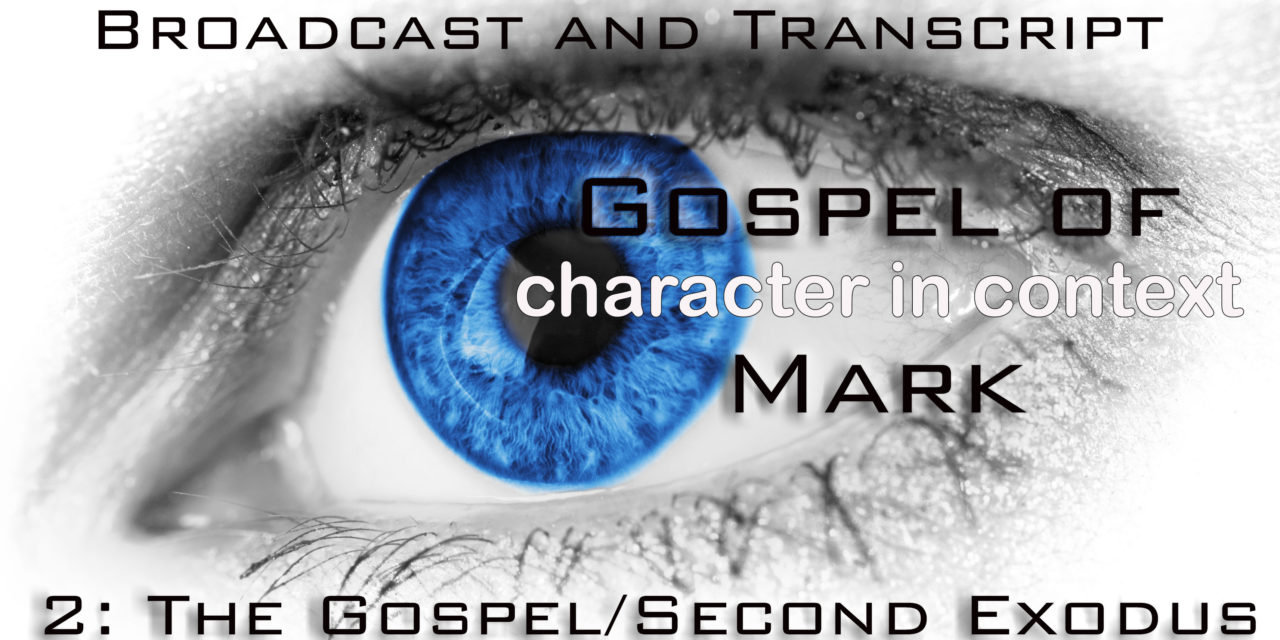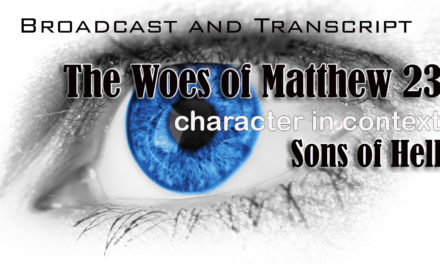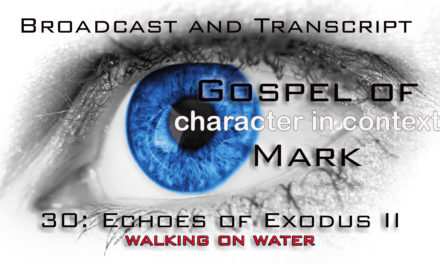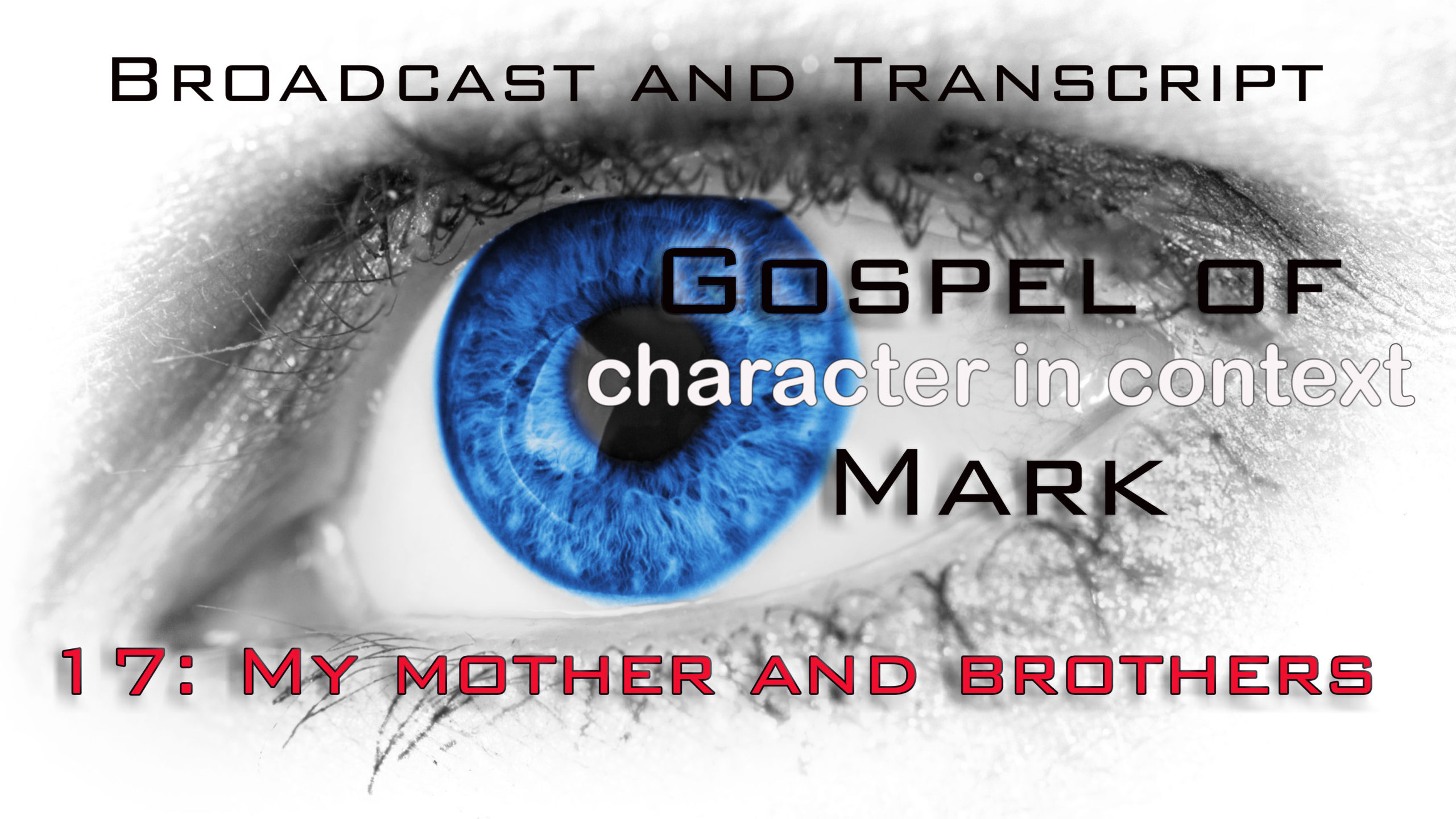One of the most common questions I get is “what exactly is the Gospel?” As Mark 1:1 uses that term, we need to explore it and talk about what it is and isn’t. I will give you a hint–it isn’t the “death, burial and resurrection” of the Messiah since He and His disciples were all recorded as preaching the Gospel before His death, and we all know how clueless His disciples were about His impending death and resurrection.
We’re also going to cover the very misused concept of the “Greater Exodus” and talk about how some interpretations have led to some very ethnocentric, technocentric and socioeconomically disastrous doctrines.
Transcript below–not super edited. Reference list attached at the end for the entire series.
**************
Mark 1:1–The Gospel of Jesus Christ and the Greater Exodus
Growing up, I was always led to believe that the Gospel was the death, burial, and resurrection of Christ. Indeed, that is how it is often presented in non-scholarly circles—but does it make any logical sense within the context of the Biblical text, Yeshua’s/Jesus’s sermons, and the epistles? What does the word Gospel mean and how has that meaning morphed over time? As this week marks our first foray into the Gospel of Mark, we are going to spend the time on the first verse—clarifying exactly what the Gospel that Yeshua preached, actually was.
Hi, I am Tyler Dawn Rosenquist and welcome to Character in Context, where I teach the historical and ancient sociological context of Scripture with an eye to developing the character of the Messiah. If you prefer written material, I have five years worth of blogs at theancientbridge.com as well as my six books available on amazon—including a four-volume curriculum series dedicated to teaching Scriptural context in a way that even kids can understand it, called Context for Kids—and I have two video channels on YouTube with free Bible teachings for both adults and kids. You can find the link for those on my website. Past broadcasts of this program can be found at characterincontext.podbean.com.
Scripture references are mostly Tree of Life Version this week.
Mark 1:1 reads, “The beginning of the gospel of Jesus Christ, the Son of God.”
We don’t even give it a second glance, and yet it is so packed full of meaning. It isn’t a shocking statement now, but it very much was when it was written. It doesn’t, like Matthew and Luke, begin with the beginning of His earthly life, or a genealogy going all the way back to Abraham or Adam. It begins with a declaration of the substance of the ministry of the Messiah—to preach the Gospel of the Kingdom as the one unique Son of God.
Last week we talked about the title “Son of Man” but this week we have Son of God, which is very much different and yet very much related—but we’ll get to that later on.
Our English word Gospel comes from the Anglo-Saxon word “godspell” which means good story. It is the translation of the Greek word evangelion, which scholar NT Wright describes this way: “evangelion is a regular technical term, referring to the pronouncement of a great victory, or to the birth, or accession (coming to the throne) of an emperor.”
The most famous use of the term outside of the Bible is in this proclamation of the greatness of Augustus Caesar, “The most divine Caesar…we should consider equal to the Beginning of all things…for when everything was falling into disorder and tending toward dissolution, he restored it once more and gave the whole world a new aspect; Caesar…the common good Fortune of all…The Beginning of life and vitality…All the cities unanimously adopt the birthday of the divine Caesar as the new beginning of the year…Whereas the Providence which has regulated our whole existence…has brought our life to the climax of perfection in giving to us the emperor Augustus…who being sent to us and our descendants as Savior, has put an end to war and has set all things in order; and whereas, having become God manifest, Caesar has fulfilled all the hopes of earlier times…the birthday of the God Augustus has been for the whole world the beginning of good news concerning him.” (The Priene Inscription, written 9 BCE)
No, it’s not just your imagination—Luke 2 was written in the exact same way—for the exact same reason—to announce the breaking into history of a great king. But I am getting ahead of myself.
Check out that last line of the Priene Inscription—“the beginning of the good news (evangelion) concerning him.” Now check out Mark 1:1 again, “The beginning of the gospel/good news/evangelion of Jesus Christ, the Son of God.” But is Mark 1:1 heralding the beginning of the “death, burial, and resurrection” of the Son of God?” No, not at all—the beginning marks the beginning of all that He came to do. His death, burial, and resurrection are nothing without the message He preached and all the things He did. It’s a package deal.
Just think on it—if the Gospel was referring to the death, burial, and resurrection of Yeshua, then how come thirteen of the fourteen times it is mentioned in the synoptic Gospels, is the preaching of it mentioned only one time after His death? If the whole Gospel was the death, burial, and resurrection —well, no one would have a clue what He was talking about and no one would have called Him the Messiah. I can assure you that when He sent out the disciples, and then the seventy, He wasn’t telling them “Go out and tell everyone that I am going to be crucified and die for their sins and be raised on the third day.” For one thing, the disciples were terminally clueless about that part if and whenever they got wind of it, they fought against the idea—they sure weren’t preaching it. No, they were preaching and teaching that the Kingdom of God, at long last after centuries of exile and foreign oppression, was at hand and they were backing up the claims with acts of God—healing, exorcisms, and miracles.
Evangelion refers to the pronouncement of a great victory, an ascension to the throne. As we will see going through Mark over the course of the next year or so, that is exactly what Yeshua is going to do. He is going to proclaim the arrival of the Kingdom of Heaven/Kingdom of God, He is going to win incredible battles against the demonic forces plaguing the people of God, He is going to command the sea and the storm, perform great healings and even raise the dead. In short, He is going to prove that the Kingdom of God has arrived, at long last, in force, in power. The Greater Exodus is at hand.
9 Go on up to a high mountain,
O Zion, herald of good news (evangelion in the LXX);
lift up your voice with strength,
O Jerusalem, herald of good news (*);
lift it up, fear not;
say to the cities of Judah,
“Behold your God!”
10 Behold, the Lord God comes with might,
and his arm rules for him;
behold, his reward is with him,
and his recompense before him.
11 He will tend his flock like a shepherd;
he will gather the lambs in his arms;
he will carry them in his bosom,
and gently lead those that are with young.
Now, after all this time of oppression, God coming to His people to set them free is like the best news ever. Except—well, it wasn’t happening exactly the way they expected or thought it should happen. The religious leaders, in particular, weren’t too thrilled about Yeshua’s message—which wasn’t warlike at all and frankly, wasn’t doing a thing to back up their game. According to the Dead Sea Scrolls, Messiah was supposed to come and slaughter the gentiles—repaying them for everything they had done to God’s people. Then, in the aftermath and under the rulership of the restored Davidic monarchy, they would once again have the prominence that they had under Solomon, and the survivors of the nations would bring wealth to them and serve them. That was their expectation of the good news that the Messiah would bring. Hey, cut them some slack, it was a brutal time and I know people who want all that and more to happen to people who simply disagree with them on Twitter!
The people were longing for the time when they would no longer look back longingly on the first Exodus out of Egypt but would be celebrating the present reality of a Greater Exodus where they would once and for all be delivered from the tyranny of all the nations under whose boot they currently found themselves. And that Exodus would be only them and only for them. But there was a problem—you see, the first Exodus included freedom for “the mixed multitude” as well as for the children of Israel. In fact, some believe that the bulk of those who left Egypt were in fact members of the nations who had joined themselves to Israel and sojourned with the tribes. Notice there was no camp of the Nations. And seventy people don’t become over a million within just a handful of generations. No, the template, the tavnit in Hebrew, was always for everyone who would forsake Pharaoh and trust God—God being no respecter of persons—as Peter finally learned in Acts 10. Hundreds of years’ worth of bitterness due to oppression and crushing poverty had caused the Jews of the first century to forget this and to very much become revenge-minded, but it was always part and parcel of God’s mercy on all the world and His loyalty toward those who trust Him.
Simply put, the bulk of those saved during the Exodus out of Egypt could be the Gentiles, and so the pattern dictates that the same would during the Greater Exodus.
But what is the Second, or Greater Exodus? First, I want very much to discuss what it is not. I get panicked messages from time to time from people who are poor, or disabled, and who live in areas where they do not have transportation. Honestly, most of the world doesn’t have the sort of transportation options that we have in most places in America. And so that’s what makes what I am about to relate to you very upsetting. Although I have never heard it taught myself, I have had so many upset people relate it to me that I know it isn’t just confined to one congregation. The idea is this, and I repeat that I don’t know where this idea comes from—but that the Second Exodus will take us all from all over the world and plant every believer into the Holy Land. Now, if this was going to happen supernaturally, it wouldn’t be so bad, but I have people who are disabled, impoverished, elderly, and without transportation actually being told that a land bridge will open up between North or South America and Europe/Africa and you will only have a certain amount of time to get there in your RV, which had better be full of food and enough gas to get across in one shot, before it is covered with water again and everyone who didn’t get over in enough time will be like Pharaoh’s armies. No, I didn’t make that up. Problem is, of course, the Bible doesn’t describe anything of the sort, and by its very nature, this is a teaching that presumes that all believers have cars or should have cars. That they can all drive to wherever and get across in time. I mean, seriously, the problem is that this is a doctrine for the privileged and the impoverished need not apply. They are out of luck. This deal if for drivers only. Can anyone come up with any doctrine in Scripture that denies access to the Kingdom of God to everyone but the wealthy? What about the tribesmen in the Amazon rainforest who live primitively but have Messiah as their Savior? Sorry guys! You should have adopted technology because that’s what God wants for us—technological advancement. Or people living in cities who often do not have cars at all, but use public transportation and/or walk everywhere.
And I am not just picking on this because there are a ton of doctrines that come out of the Western world that presume a need for technology in order to be acceptable to God and eligible for the things of the Kingdom. That’s just nonsense—one of the main thrusts in the Gospels is that justice has come to the oppressed and that they will be great in the Kingdom through faithfulness alone. Look, any doctrine that puts non-technological people on the outside and technological people on the inside is not lining up with the Word. Sometimes, when people tell us something we really need to stop and think it through. Like the time when I was seven at my first sleepover and some older kid scared me with a story about how a crab latched on to a man’s finger and they couldn’t get it to release, so they cut his finger off. It took me years to revisit that in my mind and just roll my eyes, realizing that they would have harmed the crab, and not the human, in order to save the finger. I mean, seriously, but I was so upset that I stopped thinking. Plus, I was seven and as soon as I heard the bit about finger amputation, all chance of anything but an emotional response went straight out the window.
So, no, the Greater Exodus that I guess some folks teach is not the Greater Exodus described in the Gospels and Epistles. Very simply put, Exodus is a deliverance from slavery—not so much a journey from one place to another. The Exodus out of Egypt led God’s people to Sinai where they got a new and eternal King, God, not to the Holy Land. The journey to Israel was still yet to begin. Once they got past the Yam Suph, sometimes rendered the Red Sea in English, they were no longer slaves of Pharaoh. Therefore, at that point, they began to sing and dance. They were free. Once they were free, the focus shifted and they had to learn to seek out, wait for and depend on God for the supply of their every need. Then came Sinai where they entered into a formal Covenant with God.
But the definition of Exodus is “a massive departure of people.” Exodus is not an arrival, but a leaving, an abandoning of a place, a withdrawal, an evacuation. The goal of Exodus isn’t to go somewhere, but to leave somewhere.
The Gospels very much describe the sinful condition of first-century Israel, as well as the surrounding world. Matthew 23, which I’ve already done a series on, describes a religious elite that was completely out of touch with God’s intentions. The chief priesthood, as opposed to the faithful rank and file priests, was corrupt and collaborating with Rome—and becoming rich doing it. Normal Jews were suffering terribly. In Nehemiah chapter 9, back in the Land right after the exile, Nehemiah pours out his heart to God because although they are back in the Land, they know they are still slaves, giving the fruit of the Land to oppressive foreign overlords as part of their ongoing punishment for violating the covenant. What they wanted, what they were longing for, was forgiveness, complete atonement. They need salvation from their national sins. For them, salvation was never simply a personal thing, but instead, community-focused, corporate. God moved by saving the nation time and again, not individual by individual. We see this especially in the time of the judges where He would raise up deliverers. The Jews were looking for the next deliverer, the Messiah. The Pharisees believed that by building excessive fences around the Torah that they would usher in the type of society that would earn God’s favor and that He would send the Messiah to get the kingdom back from the Romans, but what God was looking for, which we will see next week, was a repentant and broken society in need of mercy. Yoma 9b in the Talmud, however, tells us that this does not describe the Jews of the first century at all—that it was a time of senseless hatred and infighting.
They were in their own land and had the Temple, yet the Gospels are written as Exodus accounts. How can this be? If Exodus is about going to the Holy Land, which I have already established it isn’t, then what kind of Exodus are Mark and Isaiah (we’ll talk about this at length in the coming weeks) referring to?
Namely, it refers to the worldwide exodus out of sin and death, out of brazen idolatry and enslavement to the forces of evil, enacted at the Cross. There has been no greater salvation in all of history, nor will there ever be. An Exodus out of a place, as the Israelites in the wilderness learned, is not an exodus out of sin or death, as they sinned greatly and died in the desert as a result of it. But a release from the enslavement to sin, what could possibly be greater than that? Once again, God sent the angel of the presence, His one unique Son Yeshua, to lead His people (both Jew and Gentile) out of slavery.
Let’s read Romans 6 because Paul is here giving commentary on the Exodus out from under the power of sin and death.
6 What shall we say then? Are we to continue in sin so that grace may abound? 2 May it never be! How can we who died to sin still live in it? (I John 3:4 Whosoever committeth sin transgresseth also the law: for sin is the transgression of the law.–KJV)
3 Or do you not know that all of us who were immersed into Messiah Yeshua were immersed into His death? 4 Therefore we were buried together with Him through immersion into death—in order that just as Messiah was raised from the dead by the glory of the Father, so we too might walk in newness of life.
(Immersion/Baptism is a reference to the Nation passing through the Red Sea)
5 For if we have become joined together in the likeness of His death, certainly we also will be joined together in His resurrection— 6 knowing our old man was crucified with Him so that the sinful body might be done away with, so we no longer serve sin. 7 For he who has died is set free from sin.
8 Now if we have died with Messiah, we believe that we shall also live with Him. 9 We know that Messiah, having been raised from the dead, no longer dies; death no longer is master over Him. 10 For the death He died, He died to sin once for all; but the life He lives, He lives to God. 11 So also continually count yourselves both dead to sin and alive to God in Messiah Yeshua.
(As the children of Israel were lost to Pharaoh, who didn’t have any more authority over them and was no longer their master, so we no longer have to be subject to the whims of sin)
12 Therefore do not let sin rule in your mortal body so that you obey its desires. 13 And do not keep yielding your body parts to sin as tools of wickedness; but yield yourselves to God as those alive from the dead, and your body parts as tools of righteousness to God. 14 For sin shall not be master over you, for you are not under law but under grace.
(In other words, don’t go back to where you came from—Exodus takes you away from all that—Egypt and sin. Exodus is the gift of freedom from the powers of this world, sin and death and a new enslavement, bond servitude to God as our new Master and Lord.)
15 What then? Shall we sin because we are not under law but under grace? May it never be! 16 Do you not know that to whatever you yield yourselves as slaves for obedience, you are slaves to what you obey—whether to sin resulting in death, or to obedience resulting in righteousness? 17 But thanks be to God that though you were slaves of sin, you wholeheartedly obeyed the form of teaching under which you were placed; 18 and after you were set free from sin, you became enslaved to righteousness.
(Again, slavery and deliverance language—we can be slaves to sin/Pharaoh or slaves to righteousness/God. What do slaves do? They obey their master—they are not their own master. No one is ever truly their own master, really, we either serve life or death. In verse 17, we see that we become slaves to righteousness by “wholeheartedly obeyed the form of teaching under which you were placed” which means we live God’s way and not our own way.)
19 I speak in human terms because of the weakness of your flesh. For just as you yielded your body parts as slaves to uncleanness and lawlessness, leading to more lawlessness, so now yield your body parts as slaves to righteousness, resulting in holiness. 20 For when you were slaves of sin, you were free with regard to righteousness. 21 So then, what outcome did you have that you are now ashamed of? For the end of those things is death. 22 But now, having been set free from sin and having become enslaved to God, you have your fruit resulting in holiness. And the outcome is eternal life. 23 For sin’s payment is death, but God’s gracious gift is eternal life in Messiah Yeshua our Lord.
So, who are we going to be slaves to? It is interesting that exodus is never a one-way trip—there were people gunning to go back to Egypt over the menu choices alone. Throughout Israel’s history, they kept going back to Egypt over and over again for help from Pharaoh—Solomon even married his daughter. Kings got their horses from Egypt. It’s a pattern—even we who have been saved with so great a deliverance go back every once in a while. Addictions, porn, gluttony, cruelty, and even in the making of excessive demands on other people like Pharaoh—we like to visit Egypt. But the thing that the Exodus ensured, and the Second Greater Exodus as well, is that we don’t have to go back. We don’t need Egypt and we don’t need our sin—we just want it, it’s a strange and bizarre comfort to us. Honestly, I would go back to my video game addiction in a heartbeat if only He would release me from my oath never to play again. It’s been 8 ½ years but I would be lying to say that I don’t yearn for them. The only reason I don’t go back is loyalty. That’s my Egypt, more than anything else. I was delivered from it, so I don’t need it, and I shouldn’t ever insult God by going back there, but I long for it. It’s my thorn in the flesh—even though I was led out of there by God’s love.
So what’s your Egypt??
(Note: I went beyond this point in the broadcast talking about things that can be obsessions and addictions and some of them are not bad in and of themselves. I talked about video games, which aren’t inherently evil, eating, which we need to do, and I mentioned essential oils–and I am going to explain the last one. People can be overly defensive about, and protective of their essential oil use. I see people more passionate about them than they are about God, and really being very pushy with them to the point of treating them as a religion and as a sort of god. I have seen people who obsessively buy them and absolutely cannot get through their day without certain scents. They NEED them and not medicinally but psychologically and emotionally the way I think I NEED to eat too much. The way I used to think I NEEDED video games, the distraction and entertainment of them that swallowed up my life. Any good thing can be abused and when we come to the point where we abuse something, it becomes an Egypt to us. We long for it even when it harms us, our finances and our relationships. But the real problem with these things–like when someone goes to an oil for peace instead of getting to the root cause of their problem by going to God, is that we are circumventing His work in our lives. We are masking the problem instead of allowing Him to work in the midst of our discomfort. I do that with food. I used to do it with video games. I freely admit it. Good things can become Egypt if they mask our need for God.)
Book list Gospel of Mark (affiliate links–I earn a commission on qualifying purchses)
Isaiah’s New Exodus in Mark by Rikki E Watts (Soon to be replaced with an NICNT volume, and when that comes out I will link it here)
NICNT Gospel of Mark Commentary by William Lane
NIVAC Mark by David Garland
Contagious Holiness: Jesus’s Meals with Sinners (NSBT Series) by Craig Blomberg
A Commentary on the New Testament from the Talmud and Hebraica, Volume 1 by John Lightfoot (warning, this dude was an extreme anti-semite)
The Gospel of Mark: A Socio-Rhetorical Commentary by Ben Witherington III
The Victory According to Mark by Mark Horne
Blasphemy and Exaltation in Judaism: The Charge against Jesus in Mark 14:53-65 by Darrell L Bock
Social-Science Commentary of the Synoptic Gospels by Bruce Malina and Richard Rohrbaugh
Mark for Everyone by N.T. Wright
The Day the Revolution Began by NT Wright
Zondervan’s Illustrated Bible Commentary on the New Testament Volume 1
The IVP Bible Background Commentary of the New Testament
Reading Mark in Context: Jesus and Second Temple Judaism, edited by Blackwell, Goodrich and Maston
Dead Sea Scrolls: A New Translation by Wise, Abegg, and Cook
The Old Testament Pseudepigrapha, Vol I and II, edited by James Charlesworth
Kehati Commentary of the Mishnah
Wars of the Jews Books 3-7, Josephus, Loebs Version
Aniquities of the Jews, Josephus, Loebs Version
Mark, Tyndale New Testament Commentary Vol 2, Eckhard Schnabel
For part eight—”Messiah and Metzora”—add Leviticus by Jay Sklar, Leviticus by Jacob Milgrom, The Purity Texts by Hannah Harrington and The Kehati Mishnah Commentary (above), Tractate Nega’im
For part twenty-five— Xuan Huong Thi Pham, Mourning in the Ancient Near East and the Hebrew Bible
For part thirty-one, sixty-two and sixty-three The Lord’s Table: The Meaning of Food in Early Judaism and Christianity by Gillian Feeley-Harnik
For part fifty-six : Caligula’s Statue for the Jerusalem Temple and its Relation to the Chronology of Herod the Great by Young and Steinmann
For Part fifty-eight: “Let the Reader Understand”–A Contextual Interpretation of Mark 13:14, by Larry Perkins
The Cross from a Distance: Atonement in Mark’s Gospel (New Studies in Biblical Theology, Volume 18) by Peter Bolt
Books via Logos but also available in hard copies (linked)
The Expositor’s Bible Commentary Vol 8. Matthew, Mark, Luke by D.A. Carson, et al
The Pillar New Testament Commentary: The Gospel of Mark by James R Edwards, Jr
The NIGTC Commentary: The Gospel of Mark by RT France
The Message of Mark by Donald English
Mark: An Introduction and Commentary (TNTC) by R Allan Cole
Article List for Part 5—”Fishers of Men”
Nun, Mendel “What was Simon Peter Wearing When He Plunged into the Sea?” Jerusalem Perspective, July 1997
Nun, Mendel “Let Down Your Nets.” Jerusalem Perspective, Jan 1990
Nun, Mendel “Fish, Storms, and a Boat.” Jerusalem Perspective, March 1990
Nun, Mendel “Fish and the Sea of Galilee.” Jerusalem Perspective, Sept 1989
Bivin, David “The Miraculous Catch: Reflections on the Research of Mendel Nun.” Jerusalem Perspective, March 1992
Mark Excursus–Passover in the First Century Taborly, Joseph The Crucifixion of the Pascal Lamb, Jewish Quarterly Review, 1996
Episode 64—Joan F. Taylor, “The Garden of Gethsemane Not the Place of Jesus’ Arrest,” BAR 21 (1995): 26–35, 62.
James Barr, “Abba Isn’t Daddy” Journal of Theological Studies, vol. 39 no. 1, (1988) pp 28-47
Episode 65 —Fredricksen, Paula “Arms and the Man”
Episode 70 and 73–Joan F Taylor Golgotha: A Reconsideration of the Evidence for the Site of Jesus’s Crucifixion and Burial





















